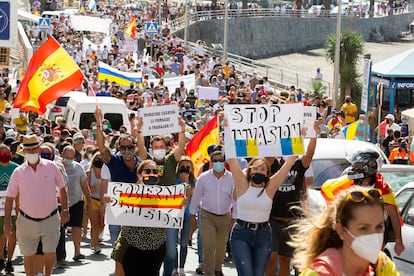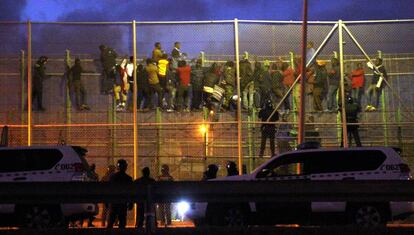Growing migrant crisis in Canary Islands pushes Spanish government to action
Madrid promises more facilities, deportations and diplomatic efforts to stem the surge, while regional leaders warn about the risk of political profit for the far right
The arrival of more than 16,000 migrants in the Canary Islands this year, and the fact that half of these arrivals took place over the last month, has pushed the Spanish government into action to deal with a growing humanitarian and political crisis.
The surge in boat landings in the archipelago, which is located off the northwestern coast of Africa, has evidenced authorities’ inability to provide adequate facilities or assistance, and raised fears that the far right could use the crisis for political profit.
Local and regional leaders have been repeatedly complaining about a lack of support from the central government, and in some coastal towns under migratory pressure, residents have been staging public protests for months.
But peaks such as the one recorded last weekend, when more than 2,000 migrants reached the islands, have forced the central government to pledge measures such as increased deportations and diplomatic efforts to stem the flow of boats in the countries of origin.
This migratory route to Spain had not seen so much activity since the so-called “cayuco crisis” of 2006, when 31,000 people arrived in the Canary Islands. The new surge coincides with a drop in land crossings at the exclave cities of Ceuta and Melilla, where coronavirus-related border closures have significantly reduced migrant arrivals. Crossings through these cities barely number 1,500 this year, compared with nearly 5,000 last year, according to Interior Ministry figures.
Spain’s all-time annual record for illegal migrant arrivals is 64,300, recorded in 2018.
Coordinated effort

Five Spanish ministries are involved in the effort to handle the current crisis in the Canaries – Migration, Interior, Foreign, Defense and Territorial Policy – under the leadership of Deputy Prime Minister Carmen Calvo. There have been at least two top-level meetings and numerous other technical gatherings to discuss an issue that has made its way to the top of the agenda of the Spanish government, a center-left coalition of the Socialist Party (PSOE) and Unidas Podemos.
And the Defense Ministry, which had remained on the sidelines until now, has offered four spaces to accommodate the migrants and prevent the kinds of scenes seen for months at the port of Arguineguín, on the island of Gran Canaria, where as many as 2,000 people at a time have been forced to sleep on the floor.
The regional head of the Canary Islands, Víctor Torres of the PSOE, has been pressuring all the relevant ministries for an urgent solution to the crisis. There is significant political concern that the situation could fuel the far-right party Vox’s anti-immigrant rhetoric, and that a phony link between migrants and Covid-19 could be exploited.
The government is hoping that arrivals will subside over the winter months, which typically see lower activity along the migration routes. But authorities are on alert after a year of record arrivals and an accelerating pace: 8,100 people had arrived to October 15, and in the month since then, that figure has soared to over 16,000.
The Interior Ministry will have the biggest role to play in managing this crisis. Spanish authorities will attempt to reinforce police cooperation with countries of origin and transit, and to increase deportation flights. On Monday of last week, a plane took 22 people back to Mauritania in the first flight to take off after being grounded for eight months due to the Covid-19 border closures.
Inclusion, Social Security and Migration Minister José Luis Escrivá has suggested transferring migrants to the Spanish mainland to relieve the pressure on the islands, but other ministers have struck down the proposal, saying it would have a pull effect. Instead, the proposed solution is to keep new arrivals in camps located inside military facilities and try to send back as many as possible.
The coronavirus is playing a key role in this crisis. Spanish secret services have identified thousands of potential migrants to Spain in Morocco, Senegal, Gambia and Mauritania, countries where law enforcement agencies are overstretched due to the pandemic and where immigration control is not currently a priority, said sources in the Spanish executive. Spain will try to help with more funds and other forms of support.
Meanwhile, border closures have modified migration routes while thousands of workers who relied on tourism or the underground economy for a living are now seeking fortune in Europe. This is the background of many of the migrants arriving in the Canaries, according to sources in the executive.
Foreign Minister Arancha González Laya will fly to Senegal, a leading source of migrant boats, on November 22. Two days before that, Interior Minister Fernando Grande-Marlaska will go to Morocco, where half of the migrants who arrived in Spain in the last two months hail from. Madrid also wants the European Union to get involved financially and diplomatically.
Tension over pushbacks

Unidas Podemos is not a part of any of the ministries involved in immigration issues, and it has not made any statements on the issue. But in February, the leftist group expressed opposition to a ruling by the European Court of Human Rights in Strasbourg that supported the pushback of two migrants caught jumping the fence in Melilla in 2014 and who filed a legal challenge.
Pushbacks have been taking place for two decades, ever since the border fences at Ceuta and Melilla were built in the late 1990s. Questioned at first, they were encoded into law in 2015 when the conservative administration of Mariano Rajoy of the Popular Party (PP) approved a controversial piece of legislation known as the Citizen Safety Law.
Spain’s Constitutional Court is this Tuesday expected to support this pushback policy, and the Interior Ministry will continue to implement these fast-track forced returns even though both parties in the current administration had originally rejected them.
The government could consider the option of reforming the law to ban pushbacks, but a source at the Interior Ministry said that immigration policy is a European-level issue, “and it is difficult that adopt a measure without European consensus.”
Neither coalition partner has made any public statements on the steps that should be taken to deal with the current crisis in the Canaries, or commented on the conditions faced by migrants upon arrival. There is also evidence that most of these individuals are not being guaranteed the legal assistance that is their right by law. Government sources said that Unidas Podemos is privately very upset about this.
The deadliest route to Europe
The Atlantic route to the Canaries is the deadliest way into Europe, this year’s figures show. For every 24 people who reach their destination, one drowns along the way, according to data provided by the International Migration Organization (IMO) updated to October 31.
This makes the route to the Canaries even deadlier than the route to Greece, where one in 98 migrants drown, or the Gibraltar Strait crossing, where the death toll is one in 145.
But the danger of the crossing is not acting as a deterrent. This past weekend, rescue services plucked over 1,000 people out of the sea. November is likely to post a new record for migrant arrivals in the Canaries, with more than 5,000 in the first two weeks alone.
Sophie Muller, the representative for Spain of the United Nations Refugee Agency (UNHCR), supported some aspects of the Spanish government’s plan to deal with the crisis, but noted that it comes “with some delay.” In an interview with the EFE news agency, she said that there has been “a lack of foresight” and that capacity has not matched the volume of arrivals.
English version by Susana Urra.
Tu suscripción se está usando en otro dispositivo
¿Quieres añadir otro usuario a tu suscripción?
Si continúas leyendo en este dispositivo, no se podrá leer en el otro.
FlechaTu suscripción se está usando en otro dispositivo y solo puedes acceder a EL PAÍS desde un dispositivo a la vez.
Si quieres compartir tu cuenta, cambia tu suscripción a la modalidad Premium, así podrás añadir otro usuario. Cada uno accederá con su propia cuenta de email, lo que os permitirá personalizar vuestra experiencia en EL PAÍS.
¿Tienes una suscripción de empresa? Accede aquí para contratar más cuentas.
En el caso de no saber quién está usando tu cuenta, te recomendamos cambiar tu contraseña aquí.
Si decides continuar compartiendo tu cuenta, este mensaje se mostrará en tu dispositivo y en el de la otra persona que está usando tu cuenta de forma indefinida, afectando a tu experiencia de lectura. Puedes consultar aquí los términos y condiciones de la suscripción digital.








































